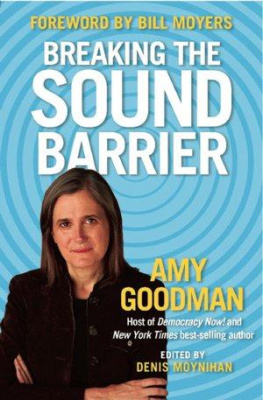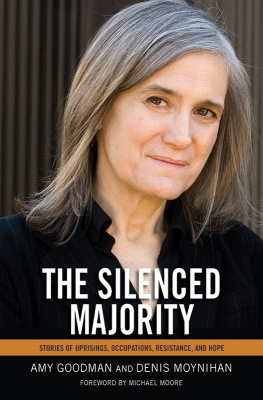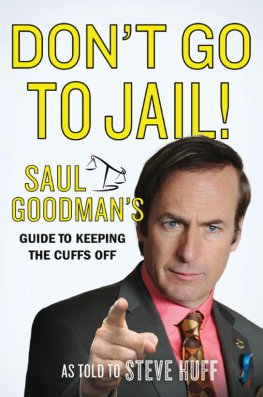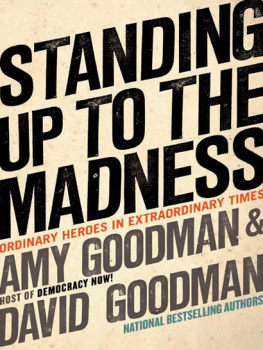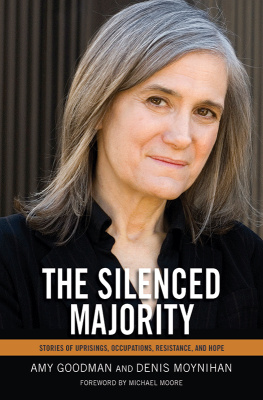Amy Goodman is an internationally acclaimed journalist. She has won many of the most prestigious awards in journalism, including the George Polk Award, the Alfred I. duPont-Columbia University Award, and the Robert F. Kennedy Prize for International Reporting. Democracy Now ! airs on more than 200 radio and TV stations around the world.
David Goodman is an award-winning independent journalist whose articles have appeared in The Washington Post, Mother Jones, Outside, The Nation , and numerous other publications. He is the author most recently of the critically acclaimed Fault Lines : Journeys into the New South Africa . He lives with his wife and two children in Vermont.
People often ask us in our travels, What gives you hope?
You do, we reply time and again. The people and movements we write about in this bookand the countless deserving activists who are not chronicled hereare the reason why.
Protesting is an act of love. It is born of a deeply held conviction that the world can be a better, kinder place. Saying no to injustice is the ultimate declaration of hope.
But the corporate media ignores and ridicules grassroots activists who speak out. Concerned citizens are thus left wondering: Where are the millions marching in the streets to defend human rights, civil liberties, and racial justice? Where is the mass revulsion against the killing and torture being carried out in our name? Where are the environmentalists? Where is the peace movement?
The answer, as we found in our journeys around the country, is that activists and peacemakers are everywhere. And they are changing how politics is done.
The issues of war, peace, torture, privacy, censorship, global warming, racism, and justiceto name but a few of todays burning concernshave penetrated deep into the fabric of our society. The Bush administration has kept a nation spellbound and cowed by using the threat of what Franklin Roosevelt called nameless, unreasoning, unjustified terror.
But this government crackdown has boomeranged. Suddenly, the battlefronts in this war of terror are not just in foreign deserts. There is now a war on dissent, and the battle lines are in our communities: Our libraries, schools, neighborhoods, and homes have become contested terrain. Assaulting civil liberties serves a vital political purpose for a rogue administration that lacks popular support: When dissenters are muzzled and smeared, potential adversaries are intimidated into silence. This has been a fateful overreaching by a government obsessed with maintaining power by any means necessary.
Wherever there is injustice, there is resistance. It may not begin as mass protest, but it often ends up that way. We have found people from all walks of life taking stands right where they are:
- A lone soldier inside a vast military base refusing to fight.
- A librarian standing toe-to-toe with FBI agents, declining to name names of library patrons.
- A man wearing an Arabic peace T-shirt standing up to racial profiling.
- Another man in dreadlocks in a flooded and abandoned African-American neighborhood of New Orleans hanging sheetrock, restoring life to a forsaken neighborhood, house by house.
- High school students from Connecticut performing a play about soldiers in Iraq at theaters in New York City, after being banned and shunned by their own school.
From Louisiana to Connecticut to California to Iraq, we were moved by the courage and dignity shown by ordinary people in these extraordinary times. Acting on ones conscience has entailed risk for everyone we met. Drama teacher Bonnie Dickinson risked losing her job. Conscientious objector Augustn Aguayo faced jail and separation from his wife and young daughters. Malik Rahim had to fear for his life as he confronted vigilantes in New Orleans. Psychologist Jean Maria Arrigo contemplated being ostracized by her profession. Six Jena High School students faced lives in prison instead of a future of promise.
In each instance, individuals had to take a leap of faith. They could only hope that if they led, others would follow. That is how movements are born. What begins as one, eventually becomes many.
The Connecticut librarians discovered this when they watched their terrorism trial through closed circuit TV and saw a courtroom filled with librarians who had come in solidarity.
Psychologists against torture turned out in the hundreds to demand that their colleaguesand the American Psychological Associationact as healers, not tormentors.
And the principled resistance of climate scientists was inspired by and catalyzed global warming activists to ratchet up their struggle to save our planet.
War resisters such as Army Spc. Augustn Aguayo and Lt. Ehren Watada learned they were not alone when hundreds turned out to support them as they took their courageous stands against participating in a murderous and illegal war.
Navy Seaman Jonathan Hutto and Marine Sgt. Liam Madden bravely made an Appeal for Redress, and two thousand service members joined them.
How to Stand Up to the Madness
Stopping the madness begins with a single act of resistance. The experiences of the people and movements we have profiled hold lessons that we can take into our own communities, wherever we are and whatever the issue.
1. CHALLENGE THE CORPORATE MEDIA
Instead of waiting for the corporate media to cover us, we can make our own media and communicate in our own words with our communities, and the world.
HOW YOU CAN TAKE ACTION
- Support independent media. For true democracy to work, people need easy access to independent, diverse sources of news and information. For millions of listeners and viewers, that news source is Democracy Now! (democracynow.org), a daily grassroots, global, unembedded, international, independent news hour. Launched in 1996, Democracy Now! features people and perspectives rarely heard in the U.S. corporate-sponsored media, including independent and international journalists, ordinary people from around the world who are directly affected by U.S. foreign policy, grassroots leaders and peace activists, artists, academics, and independent analysts. Democracy Now! has pioneered the largest public media collaboration in the United States. It is broadcast on Pacifica, NPR, community, and college radio stations; on public access and PBS television stations, and both satellite television networks (DISH network: Free Speech TV channel 9415 and Link TV channel 9410; DirecTV: Link TV channel 375); and on the Internet. The video and audio podcast of Democracy Now! is one of the most popular on the Web. Every week, a new public radio or television station begins airing Democracy Now! Get your local radio or television station to carry the show (find organizing information at democracynow.org or call 888-999-3877). Tune in. Hear the voices of the silenced majority. And spread the word.
- Create your own media. The independent media movement, which gained prominence in 1999 by providing grassroots coverage of the World Trade Organization protests in Seattle, has gone global. Post your own stories, photos, and media at indymedia.org . Become active in your local community radio station. Pacifica Radio (pacifica.org) was founded in 1949 as the first noncommercial independent radio network and grew to five listener-funded stations; check for affiliates in your area. Volunteer. Become involved in your local public access TV station and fight to preserve local control of public, educational, and government television (ourchannels.org).
- Stop big media. The Democratic and Republican parties have empowered the Federal Communications Commission to enable the half-dozen giant companies that own most of the media in the United States to gobble up even more media outlets. If you value local ownership and want a diversity of voices in your news, become active in the national media reform movement, including the Media Action Grassroots Network (mediagrassroots.org) and Free Press (free press.net).


